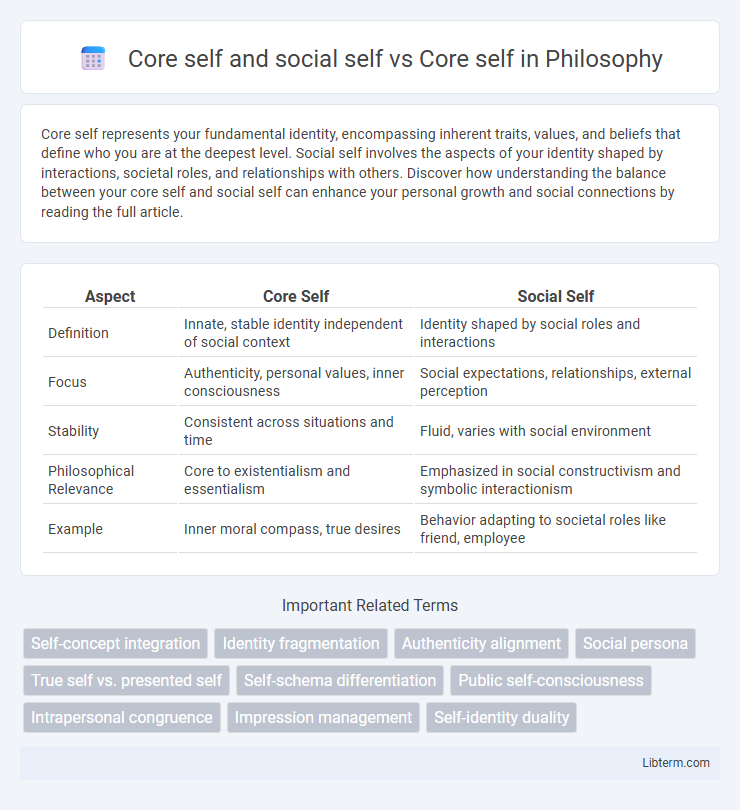Core self represents your fundamental identity, encompassing inherent traits, values, and beliefs that define who you are at the deepest level. Social self involves the aspects of your identity shaped by interactions, societal roles, and relationships with others. Discover how understanding the balance between your core self and social self can enhance your personal growth and social connections by reading the full article.
Table of Comparison
| Aspect | Core Self | Social Self |
|---|---|---|
| Definition | Innate, stable identity independent of social context | Identity shaped by social roles and interactions |
| Focus | Authenticity, personal values, inner consciousness | Social expectations, relationships, external perception |
| Stability | Consistent across situations and time | Fluid, varies with social environment |
| Philosophical Relevance | Core to existentialism and essentialism | Emphasized in social constructivism and symbolic interactionism |
| Example | Inner moral compass, true desires | Behavior adapting to societal roles like friend, employee |
Understanding the Core Self
The core self represents the fundamental, stable aspects of identity that remain consistent across various social contexts, emphasizing intrinsic traits and values. Unlike the social self, which adapts based on interpersonal interactions and external expectations, the core self provides a deeper understanding of personal authenticity and self-concept. Focusing on the core self enhances self-awareness by prioritizing internal beliefs and core motivations over socially influenced behaviors.
Defining the Social Self
The social self is defined by interactions, roles, and relationships within society, reflecting how individuals perceive themselves through others' eyes. Core self represents the intrinsic, stable sense of identity, independent of external validation or social context. Differentiating the social self emphasizes the influence of social environments in shaping self-concept, distinct from the enduring traits of the core self.
Core Self vs. Social Self: Key Differences
Core self represents an individual's authentic identity, encompassing intrinsic values, thoughts, and emotions that remain consistent across situations. Social self refers to the persona shaped by social interactions, roles, and external perceptions, often adapting to various contexts. The key difference lies in the core self's stability and internal origin, whereas the social self is dynamic and influenced by external social environments.
Psychological Foundations of the Core Self
The Core Self in psychological theory represents an individual's stable, internal sense of identity, encompassing intrinsic traits, values, and beliefs that remain consistent across situations. The Social Self expands this by incorporating external influences and social contexts, reflecting how individuals adapt their identity based on social interactions and relationships. Research in the Psychological Foundations of the Core Self emphasizes neural and cognitive processes that underpin self-awareness, self-regulation, and the integration of self-related information, highlighting its role in maintaining psychological coherence and resilience.
The Role of Social Self in Identity Formation
The social self plays a crucial role in identity formation by mediating interactions between the core self and the external social environment, influencing self-concept through feedback and social roles. This dynamic relationship helps individuals internalize societal norms, values, and expectations, shaping their behavior and self-perception. By integrating social experiences, the social self enriches the core self, fostering a coherent and adaptable identity within diverse social contexts.
Interactions Between Core Self and Social Self
Interactions between the core self and social self shape an individual's behavior and identity in different contexts, as the core self represents intrinsic personal traits while the social self adapts to external social expectations. These dynamic exchanges influence self-perception, emotional regulation, and decision-making processes, reflecting the balance between authentic individuality and social conformity. Understanding this interplay provides insights into psychological resilience, interpersonal relationships, and social functioning.
Personal Authenticity: Balancing Core and Social Selves
The core self represents an individual's true values, beliefs, and intrinsic identity, forming the foundation of personal authenticity. The social self encompasses the roles and behaviors adapted to social environments, influencing how individuals express their core self publicly. Balancing core and social selves is crucial for personal authenticity, enabling individuals to navigate social expectations while maintaining alignment with their genuine identity.
Social Influences on the Core Self
Core self represents the stable, intrinsic aspects of identity, while social self evolves through interactions and social contexts shaping self-perception. Social influences such as cultural norms, peer feedback, and societal roles impact the development and expression of the core self by reinforcing or challenging internal beliefs. Research indicates that ongoing social experiences dynamically modulate core self-concepts, highlighting the interplay between inherent traits and external social environments.
Benefits of Integrating Core and Social Selves
Integrating the core self and social self enhances psychological well-being by fostering authenticity and improving social relationships. This alignment reduces internal conflicts and increases resilience against stress, promoting a cohesive identity. Benefits include greater emotional stability, enhanced self-esteem, and more meaningful interpersonal connections.
Strategies for Nurturing a Strong Core Self
A strong core self serves as the foundation for authentic identity, distinguishing intrinsic values from external social influences and enabling resilience in diverse situations. Strategies for nurturing a robust core self include consistent self-reflection, setting personal boundaries, and engaging in activities that affirm individual strengths and beliefs. Cultivating self-awareness strengthens emotional regulation and promotes autonomy, thereby enhancing overall psychological well-being.
Core self and social self Infographic

 libterm.com
libterm.com